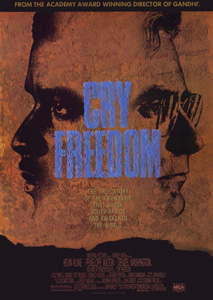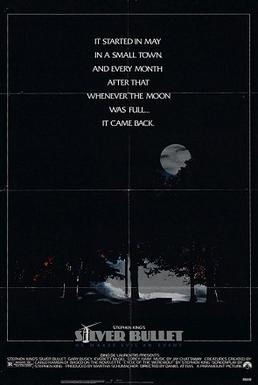Related Research Articles

Cry Freedom is a 1987 epic apartheid drama film directed and produced by Richard Attenborough, set in late-1970s apartheid-era South Africa. The screenplay was written by John Briley based on a pair of books by journalist Donald Woods. The film centres on the real-life events involving South African activist Steve Biko and his friend Donald Woods, who initially finds him too radical, and attempts to understand his way of life. Denzel Washington stars as Biko, while Kevin Kline portrays Woods. Cry Freedom delves into the ideas of discrimination, political corruption, and the repercussions of violence.

Foxy Brown is a 1974 American blaxploitation film written and directed by Jack Hill. It stars Pam Grier as the title character who takes on a gang of drug dealers who killed her boyfriend. The film was released by American International Pictures as a double feature with Truck Turner. The film uses Afrocentric references in clothing and hair. Grier starred in six blaxploitation films for American International Pictures.

I'm Gonna Git You Sucka is a 1988 American blaxploitation parody film written, directed by and starring Keenen Ivory Wayans in his directorial debut. Featured in the film are several noteworthy African-American actors who were part of the genre of blaxploitation: Jim Brown, Bernie Casey, Antonio Fargas and Isaac Hayes. It co-stars John Vernon, Kadeem Hardison, Ja'net Dubois, John Witherspoon, Damon Wayans, Clarence Williams III and Chris Rock, and acts as the film debuts of comedian Robin Harris and brothers Shawn and Marlon Wayans.

Silver Bullet is a 1985 American horror film based on the 1983 Stephen King novella Cycle of the Werewolf. It stars Gary Busey, Everett McGill, and Corey Haim, with Megan Follows, Terry O'Quinn, Lawrence Tierney, Bill Smitrovich, Kent Broadhurst, David Hart, and James Gammon in supporting roles. The film is directed by Dan Attias, written by King and produced by Martha De Laurentiis.
Ed Guerrero is an American film historian and associate professor of cinema studies and Africana studies in the Department of Social and Cultural Analysis at New York University Tisch School of the Arts. His writings explore black cinema, culture, and critical discourse. He has written extensively on black cinema, its movies, politics and culture for anthologies and journals such as Sight & Sound, FilmQuarterly, Cineaste, Journal of Popular Film & Television, and Discourse. Guerrero has served on editorial and professional boards including The Library of Congress' National Film Preservation Board.
Ken Gampu was a South African actor.

Hood film is a 1990s film genre originating in the United States, which features aspects of urban African American or Hispanic American culture. John Singleton, Mario Van Peebles, F. Gary Gray, Hughes Brothers, and Spike Lee are all directors who have created work typically classified as part of this genre. The genre has been identified as a sub-genre of the gangster film genre.

Cotton Comes to Harlem is a 1970 American neo-noir action comedy film co-written and directed by Ossie Davis and starring Godfrey Cambridge, Raymond St. Jacques, and Redd Foxx. The film, later cited as an early example of the blaxploitation genre, is based on Chester Himes' novel of the same title. The opening theme, "Ain't Now But It's Gonna Be," was written by Ossie Davis and performed by Melba Moore. The film was one of the many black films that appeared in the 1970s and became overnight hits. It was followed two years later by the sequel Come Back, Charleston Blue.
Killarney Film Studios was a South African film studio established in Johannesburg by New York native and business tycoon Isidore W. Schlesinger in 1915 and is regarded as "the first motion picture studio in Africa". Schlesinger moved to South Africa in 1894, against his family's wishes, when he read about the discovery of gold in Witwatersrand. In 1913, having accumulated wealth throughout various ventures, he ventured in to the entertainment industry in 1913 when he purchased the Empire Theatre in Johannesburg for £60,000 and converted what was an "insolvent" business into a flourishing one named African Consolidated Theatres, which worked on the national distribution of content like variety shows and films from the Cape of Good Hope to the Zambezi River.

Blaxploitation is an ethnic subgenre of the exploitation film that emerged in the United States during the early 1970s, when the combined momentum of the civil rights movement, the Black power movement, and the Black Panthers spurred black artists to reclaim power over their image, and institutions like UCLA to provide financial assistance for students of color to study filmmaking. This combined with Hollywood adopting a less restrictive rating system in 1968. The term, a portmanteau of the words "black" and "exploitation", was coined in August 1972 by Junius Griffin, the president of the Beverly Hills–Hollywood NAACP branch. He claimed the genre was "proliferating offenses" to the black community in its perpetuation of stereotypes often involved in crime. After the race films of the 1940s and 1960s, the genre emerged as one of the first in which black characters and communities were protagonists, rather than sidekicks, supportive characters, or victims of brutality. The genre's inception coincides with the rethinking of race relations in the 1970s.

District 9 is a 2009 science fiction action film directed by Neill Blomkamp in his feature film debut, written by Blomkamp and Terri Tatchell, and produced by Peter Jackson and Carolynne Cunningham. It is a co-production of New Zealand, the United States, and South Africa. The film stars Sharlto Copley, Jason Cope, and David James, and was adapted from Blomkamp's 2006 short film Alive in Joburg.

Dredd is a 2012 science fiction action film directed by Pete Travis and written and produced by Alex Garland. It is based on the 2000 AD comic strip Judge Dredd and its eponymous character created by John Wagner and Carlos Ezquerra. Karl Urban stars as Judge Dredd, a law enforcer given the power of judge, jury and executioner in a vast, dystopic metropolis called Mega-City One that lies in a post-apocalyptic wasteland. Dredd and his rookie partner, Judge Anderson, are forced to bring order to a 200-storey high-rise block of apartments and deal with its resident drug lord, Ma-Ma.

Mandela: Long Walk to Freedom is a 2013 biographical film directed by Justin Chadwick from a script written by William Nicholson and starring Idris Elba and Naomie Harris. The film is based on the 1994 autobiographical book Long Walk to Freedom by anti-apartheid revolutionary and former South African President Nelson Mandela.
Oliver Hermanus is a South African film director and writer. He is known for his films Shirley Adams (2009), Beauty (Skoonheid) (2011), The Endless River (2015), Moffie (2019), and Living (2022). Beauty won the Queer Palm Award at the 2011 Cannes Film Festival.

The Suit is a short drama film from South Africa written and directed by Jarryd Coetsee, and produced by Luke Sharland, based on the short story by Can Themba. The film stars Tony Award-winner John Kani as Mr. Maphikela, and his son, Atandwa Kani as Philemon. Phuthi Nakene plays Matilda.

Escape from Pretoria is a 2020 Australian prison film co-written and directed by Francis Annan, based on the real-life prison escape by three political prisoners in South Africa in 1979, starring Daniel Radcliffe and Daniel Webber. It is based on the 2003 book Inside Out: Escape from Pretoria Prison by Tim Jenkin, one of the escapees.
Poppie Nongena is a 2019 South African biographical drama film written and directed by award-winning director Christiaan Olwagen. The film is based on a biographical novel Die swerfjare van Poppie Nongena by Elsa Joubert which is also considered as one of the finest African novels of the twentieth century. The film stars Clementine Mosimane playing the title role, Anna-Mart van der Merwe and Chris Gxalaba in the lead roles. The film was released on 31 January 2020 and received positive reviews from the critics. It won several awards and nominations at a few film festivals. The film won 12 awards in the 2019 Silwerskerm Film Festival including the Best Film Accolade. The record haul of 12 awards is regarded as the highest tally ever recorded for a single film at an Afrikaans film festival.
References
- ↑ "The propaganda films of apartheid-era South Africa". www.aljazeera.com. Retrieved 2020-03-17.
- ↑ "Bullet on the Run (1982) - IMDb".
- 1 2 "Film banned in South Africa to screen for the first time in 44 years", Channel24.co.za, 24 January 2017.
- ↑ Ryan Lenora Brown, "Blaxploitation movies, South Africa style? A lost era of film sees new light", The Christian Science Monitor , 12 March 2017.
- 1 2 3 CD Anderson, "Classic South African action film returns to the big screen", Brand South Africa, 2 February 2017.
- ↑ Tambay A. Obenson, "Exhibit Featuring Earliest-Known Feature Film Made w/ Black Actors Now At MoMA (NYC). See It!", IndieWire , 11 November 2014.
- ↑ John Hopewell, "Cohen Media Group Inks Eight-Film Gaumont Classics’ Deal for North America (EXCLUSIVE), Deals go down at Lumière Fest’s upbeat Classic Film Market", Variety, 18 October 2014.
- ↑ Gavin Haynes, "Sollywood: the extraordinary story behind apartheid South Africa's blaxploitation movie boom", The Guardian, Wednesday, 15 April 2015.
- ↑ "First Look at New Documentary to Be Included on Upcoming Joe Bullet Blu-ray Release (UPDATED)", Blu-ray.com, 6 July 2017.